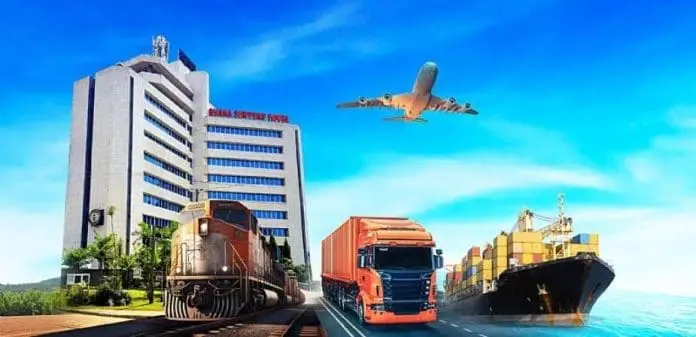By Ghana News
Copyright ghanamma

The Ghana Shippers’ Authority (GSA) and the Ship Owners and Agents Association of Ghana (SOAAG) have renewed calls for more transparent and deeper engagement to strengthen the commercial shipping sector, enhance trade, and create a more conducive business environment.
At a meeting between the two institutions, Professor Ransford Gyampo, Chief Executive Officer of the GSA, stressed the importance of continuous dialogue and data sharing across all maritime stakeholders, including shipping lines, port authorities, and government agencies. “We must listen to each other more and find a middle ground to address our challenges,” he stated. “The GSA’s role is not to take sides. We are referees in this space, here to ensure fairness and protect the broader interest of Ghana’s commercial shipping sector.”
The engagement comes as Ghana’s shipping industry faces mounting pressures from rising operational costs, bureaucratic delays, and coordination challenges among multiple state agencies involved in port operations. The GSA, restructured under a new law passed in 2024, has positioned itself as a neutral arbiter working to balance interests of shippers, shipping lines, and regulatory authorities.
A key concern raised by SOAAG was the rising cost of doing business in the country’s shipping sector. The group cautioned against blaming shipping lines alone for high charges, stating that multiple actors contribute to cost build up across the supply chain. Vice President of SOAAG, Adam Imoru Ayarna, noted that many cost elements are outside the shipping lines’ control, including those imposed by various state agencies, the burden of extra costs such as cargo destruction expenses, and auctioned cargo without recourse to shippers and SOAAG.
“We need to work together, share accurate information, and hold each other accountable,” Ayarna emphasized. His comments reflect frustrations within the shipping community about bearing responsibility for costs generated elsewhere in the logistics chain. When cargo sits too long at ports due to clearance delays or documentation problems, demurrage charges accumulate, with shipping lines often blamed for fees they argue result from inefficiencies beyond their control.
Both parties also called for improved efficiency among state agencies in the commercial shipping ecosystem to reduce bureaucratic delays and enhance operational performance. Ghana’s port clearance processes involve multiple government agencies, each with separate documentation requirements and inspection protocols. This fragmentation creates delays that increase costs and reduce Ghana’s competitiveness compared to regional ports with more streamlined procedures.
The meeting represents part of Professor Gyampo’s broader engagement strategy since assuming leadership of the GSA in February 2025. A political science lecturer at the University of Ghana before his appointment by President John Dramani Mahama, Gyampo has emphasized dialogue and data driven decision making in his approach to shipping sector challenges.
Under the Ghana Shippers’ Authority Act, 2024 (Act 1122), the GSA has expanded regulatory powers to address unfair practices, monitor non tariff barriers, and facilitate dispute resolution. The law aims to enhance efficiency, promote transparency, and strengthen the regulatory environment within Ghana’s shipping and logistics sector, providing tools for the kind of coordination both GSA and SOAAG emphasized in their meeting.
The shipping cost issue has broader economic implications for Ghana. High logistics expenses increase prices for imported goods, affecting consumer purchasing power and business competitiveness. When businesses factor in unpredictable port costs and clearance delays, some redirect cargo through neighboring countries’ ports, depriving Ghana of transit revenues and diminishing the economic benefits of its port infrastructure investments.
All parties agreed to a fresh commitment to cooperation, regular dialogue, and a shared vision to make Ghana a competitive commercial shipping hub in West Africa. This aspiration faces competition from ports in Togo, Côte d’Ivoire, and Nigeria, all vying for cargo volumes and positioning themselves as gateways to landlocked countries in the sub region.
For Ghana to succeed as a regional shipping hub, coordination among stakeholders becomes essential. Shipping lines need predictable cost structures and efficient operations. Shippers require fair treatment and transparent charges. Government agencies must balance regulatory oversight with facilitation of trade. The GSA’s positioning as a neutral referee reflects recognition that these interests, while sometimes in tension, ultimately align around a functioning, competitive shipping sector.
The commitment to data sharing represents a practical step toward better coordination. When stakeholders operate with different information about costs, delays, and operational challenges, misunderstandings proliferate and solutions prove elusive. Creating shared data platforms and regular reporting mechanisms could help all parties understand where problems originate and collaborate on addressing root causes rather than arguing about symptoms.
Whether the renewed commitment translates into tangible improvements will depend on implementation. Regular dialogue sessions, concrete action plans with accountability mechanisms, and measurable performance indicators would signal serious intent. Without follow through, the meeting risks becoming another in a series of consultations that produce agreement in principle but limited change in practice.